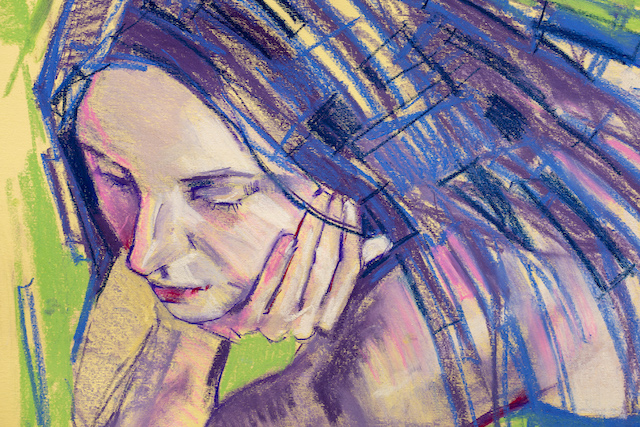
“I can’t believe what I’m managing to get through.” ~Frank Bruni
My worst fear was inflicted upon me three months ago: a cancer diagnosis—non-Hodgkin’s lymphoma. Out of nowhere!
Truth be told though, lots of awful things that happen to us come suddenly out of nowhere—a car accident, suicide, heart attack, and yes, a diagnostic finding. We’re stopped in our tracks, seemingly paralyzed as we go into shock and dissociative mode.
My world as I knew it stopped. It became enclosed in the universe of illness—tiny and limited. I became one-dimensional—a sick patient.
And I went into shock. To the point where I didn’t feel. As a person who values mental health and understands the importance of emotions, I seemingly stayed away from the feeling part. It wasn’t intentional; it’s how I coped.
I dealt by mindlessly and mindfully (yes, that seems like an oxymoron) putting one foot in front of the other and doing what needed to be done, like a good soldier, plowing through the open minefields. Actions and intentional mindset were my strategies.
My biggest fear was: Will I make it through the treatments? What if I don’t?
So I started reigning myself in to not let myself think too far ahead, down into the rabbit hole of fear and anxiety. Being a small person with no extra weight, I was scared of the chemo crushing me. Terror would rear its head when I allowed these thoughts to enter my thin body. What if I shrivel up and die? What if I can’t do it?
And so my mind work began. I became very intentional about putting up that stop sign in my head so as not to get ahead of myself and project into the unknown, scary future. I began taking everything one step at a time.
I stop now and digress. I had been in the depths of despair and darkness when, many years ago, my middle daughter, Nava, was diagnosed with lifelong neurological disabilities.
I had a noose of bitterness and anger pulled so tightly around my neck that I couldn’t even go to the park with her. My envy of the other babies who could sit up and start to climb out of their strollers was too much for me to bear; to the point where I stopped going to the playground.
My therapy at the time was a life-saver and helped me move from the unanswerable “why me/why her?” questions to the “how” and “what”: how to carry on with a major disappointment and blow, toward creating new expectations and goals, and what to do with this to still build a good life.
Changing the questions helped me cope and move forward. This has served me well in other challenges throughout the years, such as my divorce and Nava’s critical medical issues years later, for which she was hospitalized for a year.
So with the cancer diagnosis, I went to the “how” and “what.” How can I deal with this in as best a way as possible? What can I do to optimize my coping skills? How can I minimize my anxiety and fear?
Having studied positive psychology, resiliency-building, and mindfulness, I’ve gleaned some tools over the years that are serving me now through my personal medical crisis.
Let’s look at a few.
Anxiety and Staying Present
We know anxiety is caused by worry of the future. So staying present is key. Working on our mind to be in the moment and not spiral outward is crucial. I know my PET scan is coming up, and I’m naturally anxious about the results. I tell myself to take today and make it as good as possible and not think about the end of the week. There’s a lot of intentional work that goes into controlling the mind.
And when we spiral, as we humans naturally do, we allow for that too. “Permission to be human,” as positive psychologist Tal Ben-Shahar states. The important thing is bringing ourselves back. It’s not that we don’t go to dark places; it’s that we notice it and don’t linger and get sucked down into it. We recognize it and can pull ourselves out of it.
Expansion
Once the shock and horror of illness begins to settle and we see some pattern or predictability, we can look to expand our identity and role beyond a sick person, or in my case, a cancer/chemo patient. I begin to step outside myself, my illness, toward others and other things that are important to me.
Connecting with who you are beyond your sickness opens you up and reminds you of the bigger You. We are more than our difficult circumstance.
I always remember Morrie Schwartz in the book Tuesdays With Morrie—how he cried each morning (as he was dying from ALS) and was then available and present for all his visitors, to be of help and service to them.
So I reach out to a couple of clients to offer sessions during my seemingly better weeks (in between treatments). I create some (generic) social media posts. I haven’t gone personal with this online, so this blog post is a big (public) deal.
Meaning in Your Life
Doing things that are meaningful, however small, and that make you feel good is a sure way to stay engaged and moving. It’s the ordinary things that keep us going. Since I love colors, I wake up and match up colorful clothing and makeup (unless I’m too weak), as that makes me feel good.
Nature and beauty are my greatest sources of soothing and healing. When I feel okay, I go to a park, sit by the water/ocean, and visit gardens, just get outside and look at the expansive sky.
I deal with my indoor and outdoor plants. I cut off the dead heads, water them, take some pictures, and check on the veges. This represents growth and beauty.
I get inspiration and uplift from words, and love non-fiction books of people transcending their adversities. I read, underline, and reach out to authors.
And I learn. I started a creativity class with someone I actually found on this site. I figure it’s a good time to incorporate creativity and natural healing.
What infuses your life with meaning? What is important to you? What expands you? Who are you beyond your difficult situation?
Response and Choice
Viktor Frankl, psychiatrist, logotherapist (therapy of meaning and purpose), and author of the renowned book Man’s Search For Meaning, is instrumental in the foundational concept that it’s not our circumstances that define us but rather our response to our situations that determine who we are and who we become.
“Everything can be taken from a man but one thing: the last of the human freedoms—to choose one’s attitude in any given set of circumstances, to choose one’s own way.”
And another one: “Between stimulus and response there is a space. In that space is our power to choose our response. In our response lies our growth and our freedom.”
These ideas have been life-changing for me and propel me to avoid an all-too-easy passive and victim-like mentality.
About Harriet Cabelly
Harriet Cabelly, LCSW is a therapist specializing in grief, loss. and critical life situations. She's also a speaker, author, and group leader. Harriet works from the lens of positive psychology and existentialism. She has a private practice seeing clients both in-person and virtually. She is passionate about helping people cope and grow through critical life-changing circumstances. Harriet is the author of Living Well Despite Adversity: Inspiration for Finding Renewed Meaning and Joy in Your Life. Visit her at rebuildlifenow.com.













 Though I run this site, it is not mine. It's ours. It's not about me. It's about us. Your stories and your wisdom are just as meaningful as mine.
Though I run this site, it is not mine. It's ours. It's not about me. It's about us. Your stories and your wisdom are just as meaningful as mine. 